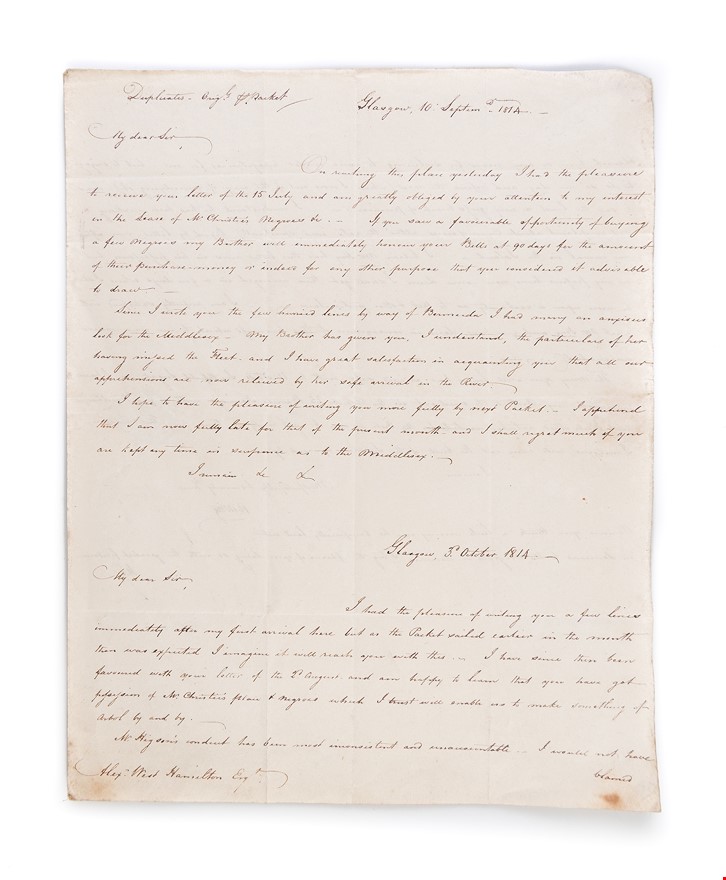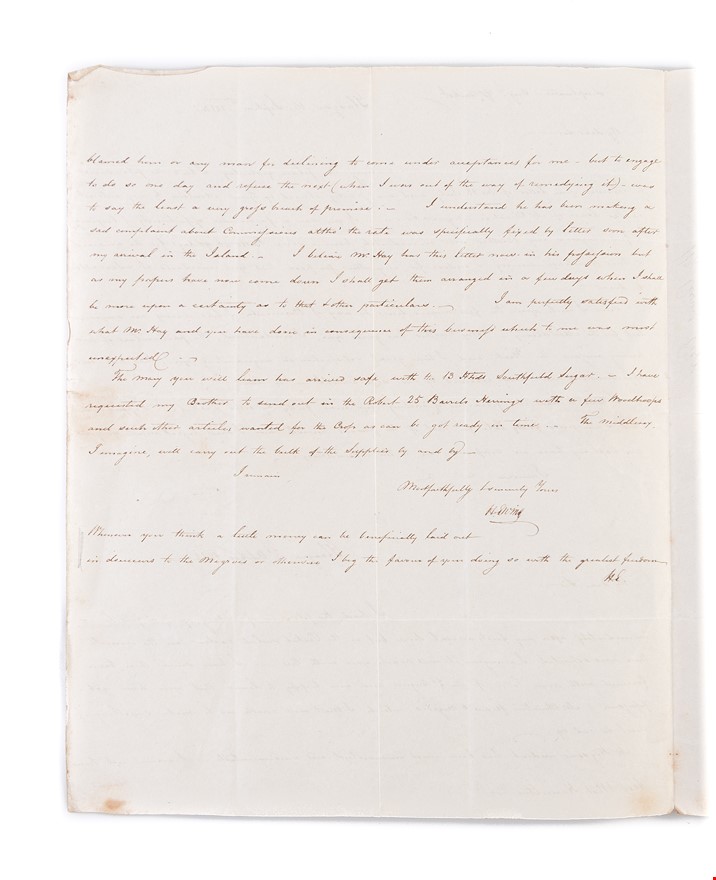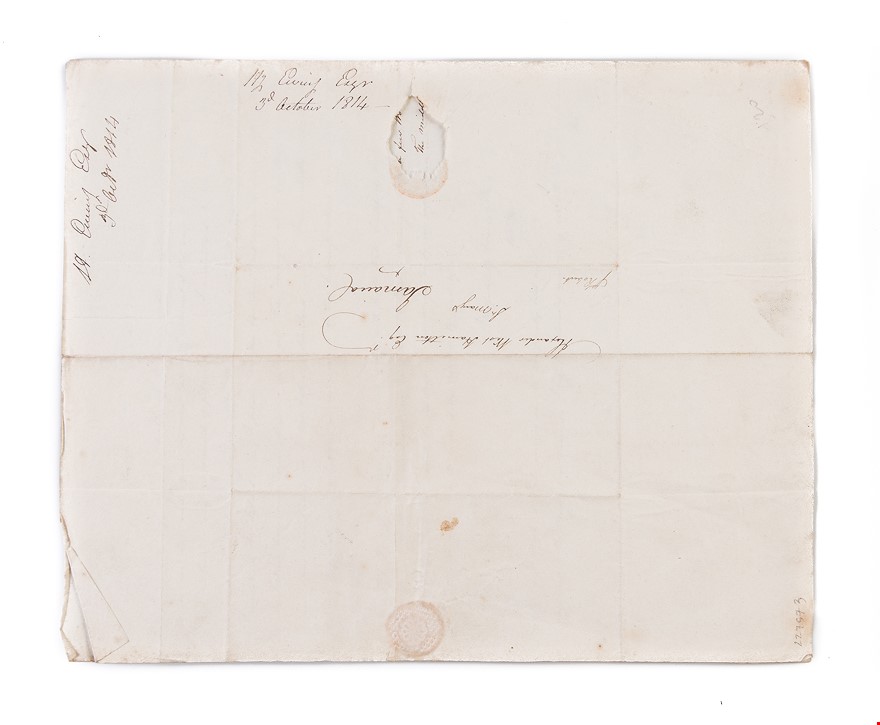ALS preceded by duplicate ALS to Alexander West Hamilton Esq, Jamaica, concerning the purchase of slaves and management of plantations in the West Indies.
EWING Humphrey (1814.)
£950.00
Please contact us in advance if you would like to view this book at our Curzon Street shop.
Manuscript in ink, bifolium written on recto and verso of first leaf, letterfold with address on verso and residual impressed wax seal, slight hole created in breaking seal, no loss. Otherwise very good. Glasgow, 10 September 1814; Glasgow, October 3rd
An interesting piece of correspondence between two Scottish slave owning merchants, at a key moment in the history of the slave trade in the West Indies.
These letters give an insight into the management of Scottish owned estates in the West Indies, and the way in which business was done between absentee and in situ plantation owners. Humphrey Ewing (1773-1860) clearly travelled back and forth between Glasgow and Jamaica, working alongside his brother James Ewing (1775-1853), a wealthy and influential import agent who later established the first savings bank in Glasgow, and became an MP. Humphrey makes reference to his brother in the letter dated 10 September 1814: "[I] am greatly obliged by your attention to my interest in the lease of Mr Christie's Negroes &c. - If you saw a favourable opportunity of buying a few negroes my Brother will immediately honour your bills at 90 days for the amount of their purchase". This business interest in then revisited in the October letter: "[I] am happy to learn that you have got possession of Mr Christie's place & negroes which I trust will enable us to make something of Arbol by and by". "Arboll" is listed in UCL's Legacies of British Slavery database as an estate registered in 1815 to Humphrey Ewing Maclae (this name added after the death of his father Walter Ewing Maclae in 1814), at that point being registered with 27 enslaved people. 1815 is the first year recording the estate at Arboll, so it is possible that the enslaved people purchased from Mr Christie were used to establish this new estate. The Ewings also owned the estate of Southfield in St Ann, and based on data from the Jamaican Almanac, it appears that between the years 1815 and 1816, they were aggressively purchasing enslaved people, the registered holdings on this property rising from 18 persons to 210 over that single year. The acquisitive approach in this letter would support this expansive attitude. The letter's recipient, Alexander West Hamilton (? - 1837) of Pinmore, Ayr was the owner of a plantation called Mango Valley, also in St Ann, Jamaica.
As this document postdates the Act for the Abolition of the British Slave Trade in 1807, it's informative on the continuation of slave trading in the West Indies after it had become illegal to capture and transport people for the purposes of slavery. Slavery itself was to remain legal until 1833, therefore the acquisition of new enslaved people for a plantation had to happen through negotiations with an existing estate rather than via the transatlantic trade with Africa. This casts an interesting light on the Ewing's rapid expansion in this period, a sentiment Humphrey Ewing is keen to press upon to Hamilton: "Whenever you think a little money can be beneficially laid out in due recourse to the Negroes or otherwise I beg the favour of your doing so with the greatest freedom."
The other concern raised in the the October 3rd letter is in regards to management issues with a Mr Higson, who it seems has been left in a position of authority in Ewing's absence: "Mr Higson's conduct has been most inconsistent and unaccountable - I would not have blamed him or any man for declining to come under acceptance for me - but to engage to do so one day and refuse the next (when I was out of the way of remedying it) - was to say the least a very gross breach of promise." He then goes on to indicate that the disagreement was over rates of commission.
The first letter (dated 10 September 1814) is a duplicate copy of a letter sent by a previous packet ship via Bermuda, and is presumably copied before the following (3 October 1814) to make sense of it in case the first did not arrive. Given the content of the letter concerning anxiety over the possible loss of the ship Middlesex, and despite Ewing's assertion that "all our apprehensions are now relieved by her safe arrival", it seems indicative of the uncertain nature of packet post that multiple copies of letters might be sent. The way in which it has been sealed and addressed would suggest however that this copy was indeed sent, rather than being a retained or secretarial copy from Ewing's papers.
Both the Ewings and Hamilton were granted major reparations for their holdings of enslaved people by the British Government, following the 1833 Slavery Abolition Act.
Stock Code: 227573






